The night of this year’s election, on a somber and eerily quiet drive home from our dear friend’s house, the melodic lines of a Boygenius song softly played on a loop in my mind:
“How it hurts to hope… how it hurts to hope for more”
I was too tired and weary for tears, but the glow of the red tail lights in front of me made my eyes sting- an all too familiar feeling. This grief. This despair. My crestfallen heart. This moment, now carving its way through my memory, leaving its mark as yet another day where life after this—would change profoundly.
How it hurts to hope for more.
The echolalia from this song filled my head with this one small line for weeks. The strange thing is, that actually I wasn’t hopeful about this election at all. I didn’t feel excited or filled with the promise of a better country, a more just country, a softer country. I’m too jaded by politics, too exhausted by empty promises, too filled with rage for the way that people needlessly suffer while our tax money goes off to war and genocide. I know our government, no matter who runs it, is corrupt and predatory. So this pit in my stomach, what is this feeling? And why the hell am I singing sad gay songs in my head about hope? Afterall, hope and I have a complicated relationship. Hope doesn’t really live in my vocabulary after the last four years.
In early November of 2020 after a slight sniffle and headache, I sat in a long line of cars winding their way through the parking garage at the MODA center’s drive-thru COVID testing center. 24 hours later I got the call that I never wanted to receive. “I’m so sorry, you have tested positive for COVID”. I was given instructions on how to isolate and where to go if my condition worsened as I quickly packed a bag of warm clothes, my computer, some books and any other creature comforts that I might need. After a tearful goodbye to my wife and animals, I headed out to “the shed”, a standalone one room dwelling next to our tiny cottage with an old couch and a small tv, stored catering supplies and our hefty collection of jarred pickles and hot sauce (our summer garden’s bounty).
At the time, we as a country were barrelling towards the winter where vaccines were not available to the public yet, COVID was terrifying (in the same way that it is now but with less information), the hospitals were overloaded and without beds, and all the health care systems seemed like they were on the brink of collapse. My wife was pregnant with our miracle baby– a pregnancy that already felt incredibly fragile and nerve wracking in the midst of a global pandemic. We had taken the biggest leap of hope and trust that we could muster once the fertility clinics opened back up again and despite all of the odds, we were finally going to become parents. We had just passed the “safe zone”, we had just had just secured a new place to live with room for our growing family— there was so much to hope for (and so much to lose).
For 2 weeks, I laid on the couch in our freezing cold shed with a space heater and a pile of blankets—tracking my headaches, my fatigue, every shiver. I repeatedly put my hand over my chest, taking deep breaths, making sure (and sometimes truly just reminding myself) that I could breathe. I ordered baby clothes online to keep my mind busy, and relished in sweet care packages sent from afar. I sat alone, through another nail biting election–though–when I woke up the next day, Biden had been elected and people were rejoicing. After what felt like the most harrowing year for everyone— maybe, just maybe, there was something building in the collective resembling “hope”. We as a country had almost a full year of reckoning with our darkness, so there’s no way things would ever be the same right?!
Maybe it’s hindsight that makes hope feel like such an ache.
14 long exhausting days later I re-emerged from the shed into the sunlight. On the day that I moved back into the house, the pregnancy tracker app alerted me that we had just hit 16 weeks– we were so close to being halfway through our pregnancy already. Our baby was the size of an avocado! Off in the distance the faint glow of a rainbow began to illuminate the sky. I giggled at this loud display of optimism and screeched for R to come outside so I could take a polaroid photo of her and her belly under it. I scribbled “4 months” at the bottom of the film square to mark this big milestone. I survived Covid. We were finally going to move! No more Trump in office! Vaccines were to be available in 2021!
Exactly one week later, at a routine prenatal appointment, on the Tuesday before Thanksgiving, I stared in disbelief at the image of our baby, her tiny body folded over and lifeless, projected on a giant screen in the corner of a large, dark ultrasound room. The only sound louder than my wife’s screams were the silence and awkwardness of the doctor and nurses around him. No one knew what to say. They told us they would give us some time and all exited the room as quickly as they could, almost clambering over each other as if not to get too close to pain, too close to our hope and dreams— now destroyed.
No one came back to that dark exam room— our cavern of grief. Eventually, I pleaded with someone to let us leave and they led us out a back door, down a secret hallway that opened right to the outside of the building.
Did you know that hospitals are literally designed to hide death? That there are hallways and secret corridors and ways of sneaking out bodies in plain sight so that no one has to see them? I now also know that those halls hold the silent screams and sobs of grieving parents. How they also carry the echoes of discomfort while shielding people from witnessing death and grief, suffering and pain. How does this divide against the living and the grieving serve us?
Spoiler alert: this story doesn’t have a happy ending. I don’t get to wrap this all up with the silver lining of a rainbow baby that came after or some sort of miraculous life lesson that propels me through the rest of my days. We experienced 5 additional miscarriages and the loss of an embryo in transfer after Birdie died. We never became parents to a living child.
Oh how it fucking hurts to hope.
As we crawl towards the winter solstice, the darkest night of the year, I think about that version of myself 4 years ago, freshly flattened by grief in a way that I had never experienced before, frozen in fear. How dark everything felt. How inconceivable it was to just keep going. How the word “hope” made me hiss and recoil.
The idea of hope has always felt like saccharine optimism to me. Maybe that’s because it’s often paired with hollow platitudes or force fed to me in moments where my own internal compass and sense of self was obliterated. I didn’t want to hear that I just needed to have hope, or to feel like my inability to trust in the future was a moral failing on my part. And if I’m being truly honest, hope also has this sneaky way of making me feel foolish sometimes, embarrassed or naive. As if I should have known better than to hope. As if I should dream less to protect my heart.
A psychic medium that we saw during the time of our 3 year fertility hell told us that the night that Birdie was born (traumatically, in our bathroom, less than 24 hours after we found out that she had died) was our “dark night of the soul”. My understanding is that the dark night of the soul is marked by a profoundly dark period or event in someone’s life that causes a crisis of faith– a moment that leaves you deep in the underbelly of the world, questioning and struggling with everything you’ve ever believed. Life loses meaning. It’s a spiritual unraveling, it’s an ego death, it’s a gritty existential crisis that strips you down and rattles you from the inside out. I wonder if what lies on the horizon for our country is it’s own dark night of the soul—though not to discount how heavy and terrorizing our world already is, but I keep trying to think about what this moment in time means for us already in the wake of so much suffering. How do we alchemize this into a revolution? How do we find the courage to look forward when so much is already being destroyed?
It’s been 48 months since I left my body that night in our tiny cottage bathroom. What has kept me here has not been an un-wavering devotion towards hope, but exploring and examining what it means to simply be present in my own brief, human experience. Every day I wrestle with what it means to be here, right now, in this moment, in this life, the only one I (we) have….no matter how disappointed or betrayed I feel by it all. I wade through the darkness by opening myself to it, challenging my spirit to notice and cultivate genuine moments of care and connection that help me stay rooted to the truth of being alive— which is far more expansive, and messy and impermanent, and holy than we think. Yes, even in the dark parts.
In grief theory, we learn about meaning-making and restoration practices in developing new narratives for ourselves around grief and loss. The idea is to develop a relationship to your grief that ebbs and flows like the tides, helping you integrate the loss into your new world that has been profoundly changed by grief. The challenge is not to try and find “meaning” in the loss itself—you’ll never hear me say “everything happens for a reason” or that there must be a purpose or bigger plan for suffering. But meaning-making asks us to determine what gives our life meaning in the wake of so much heartache. It allows us to hold both the pain and weight of our grief and losses alongside our desires and joy and new experiences. It helps us braid the strands all together. This delicate balance between light and dark is a cycle and a dance and an intricate web that we return to many times in our lifetime (if we are lucky). It helps us pay attention to who else might be singing from the lifeboat.
We know our world is headed towards its own destruction–it is dying and we can avoid it and shelter ourselves and our discomfort, or we can stare at it head on, knowing that we get to decide what we want to fight for. That amidst climate crisis and genocide and so much violence and pain and suffering, we still get to seek and create beauty and connection. It makes so much sense to feel utter despair at this moment. I never want to be someone who pretends to be okay in the face of so much horror, or who isn’t profoundly moved by human suffering. The unknown of our future is intimidating and dark and will need us all to turn towards the grief and to bear witness.
To bear witness is to honor.
To honor is to tell the truth.
This life doesn’t need artificial hope. It just needs us to show up. In all our weariness. In all our questioning. Maybe we heave ourselves into this darkness. Maybe we allow ourselves to trust-fall into each other, even against our best instinct. Maybe we say “me too” when we’re scared and also take risks when opportunities allow us to be brave. Maybe we find ourselves and each other here in this lost place, in this dark ominous place. Maybe we too, can find pockets of light in our breathtaking will to survive. Maybe we show up fully to this human experience.
Maybe we let the hope hurt.
moodboard for the times
starting from top left across:
sandhill cranes, nov 2024 / via @glenmartintaylor / Birdie’s ring
via @wholesome.quotes / a quiet scene through my binoculars / via adrienne marie brown
delicious drippy candles / chocolate cosmos via pinterest / via @desolasol.colectiva
Bookmarked:
This harm reduction guide to “self care” by Karen Hixson
Prentis Hemphill asks us, “Can we say we’re afraid yet?”
The concept of time will always blow my mind- this piece fascinated me.




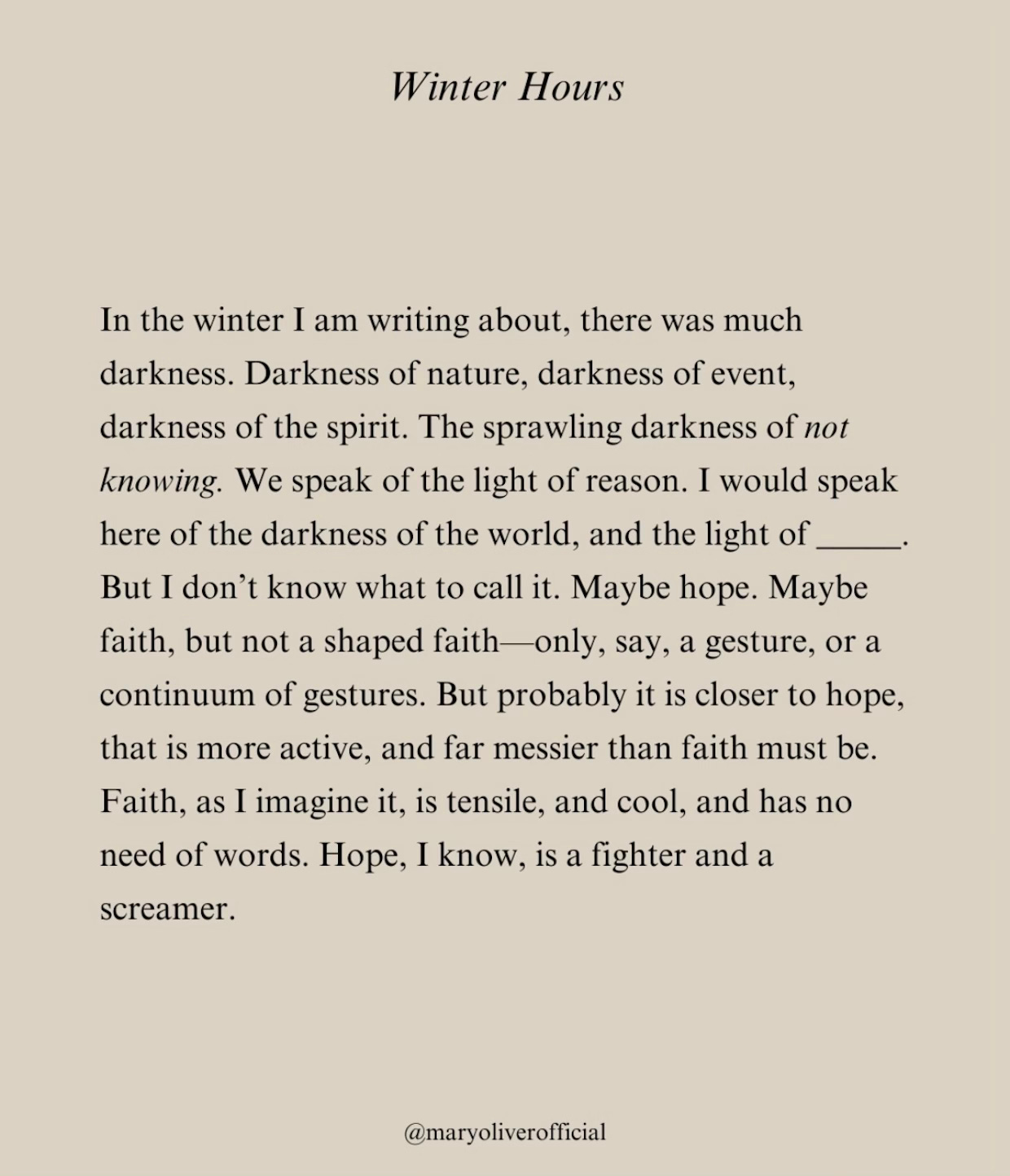

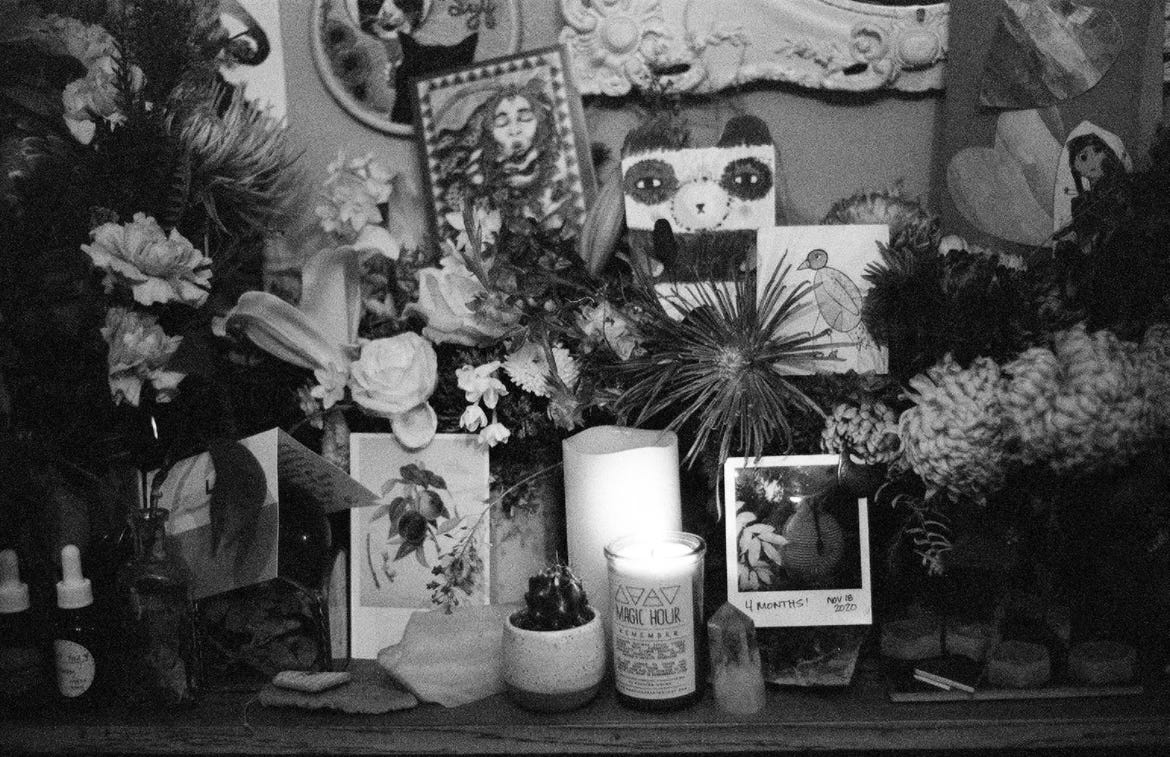
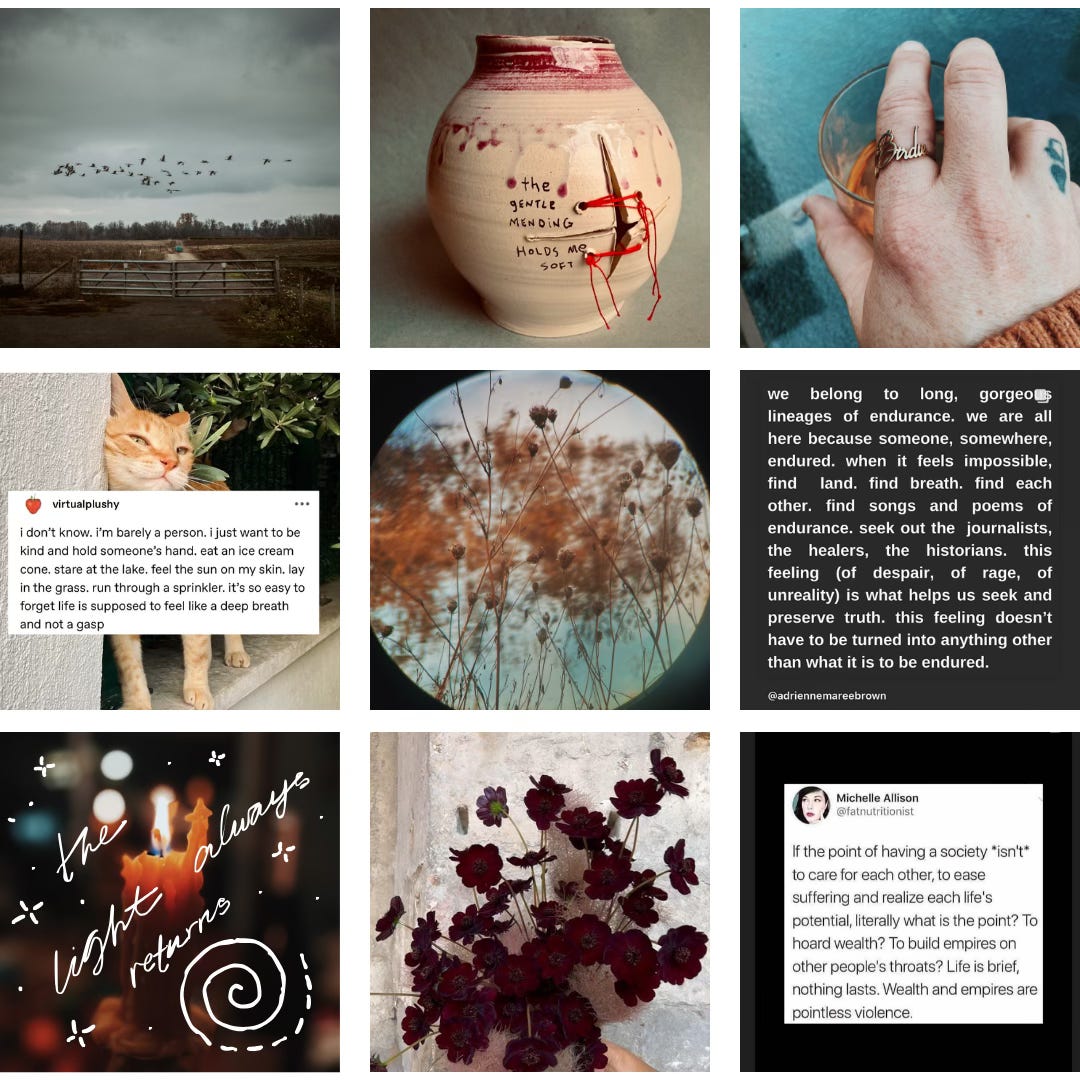


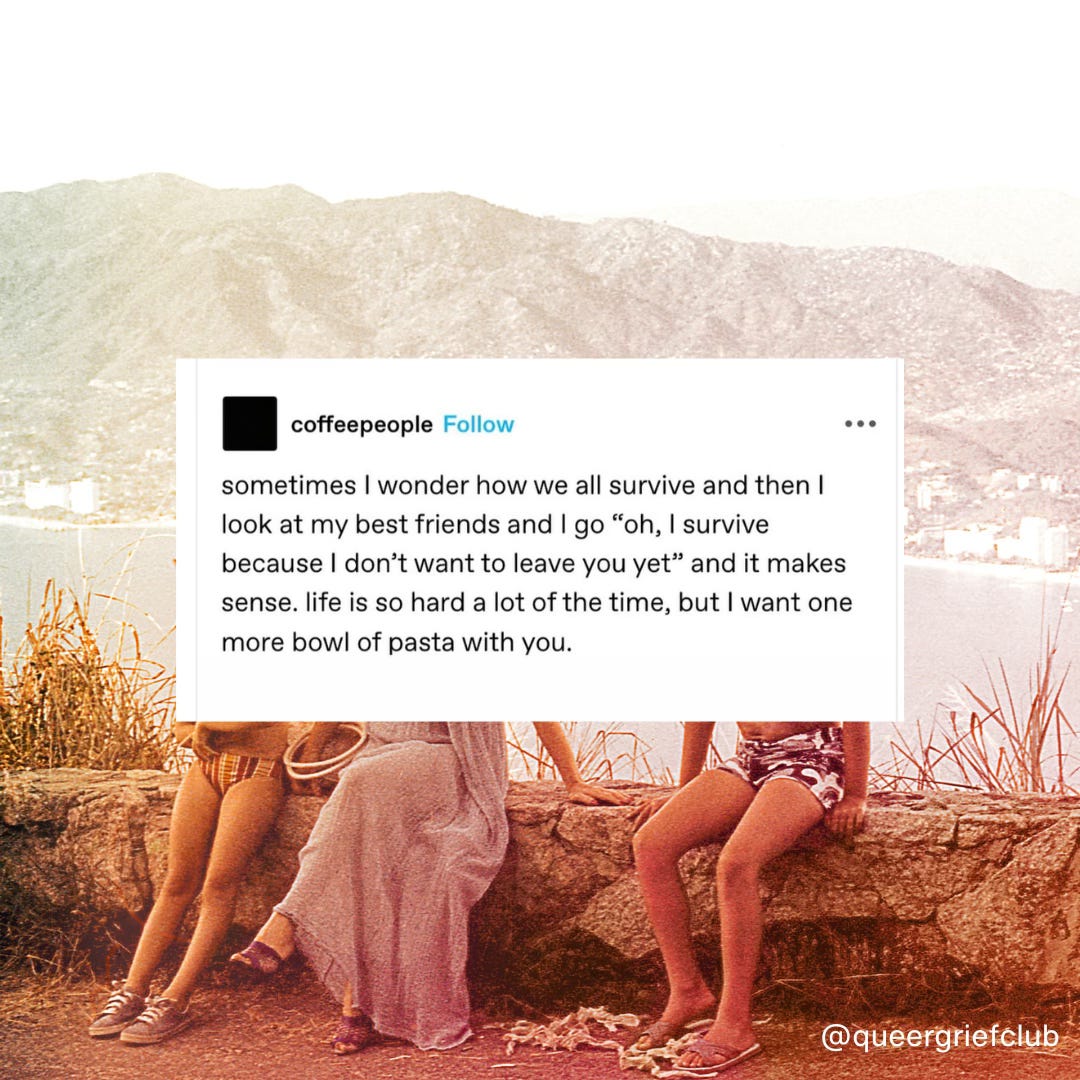
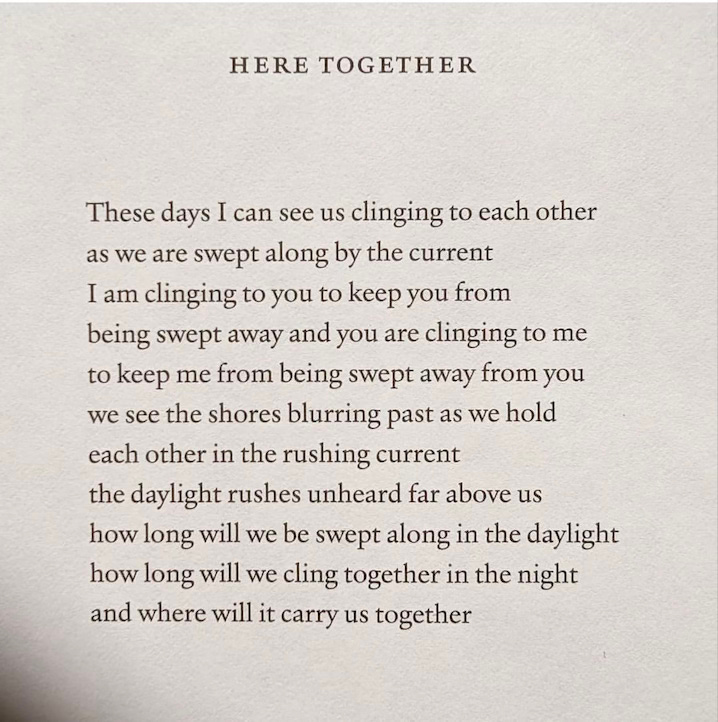
Hope is a word that's often tangled in a web of toxic positivity. Thank you for this lovely piece. Yes, hope hurts, but where would we be without it?
Oh my friend, this was a truly extraordinary piece of writing - a gift of your heart to ours. Thank you for sharing.